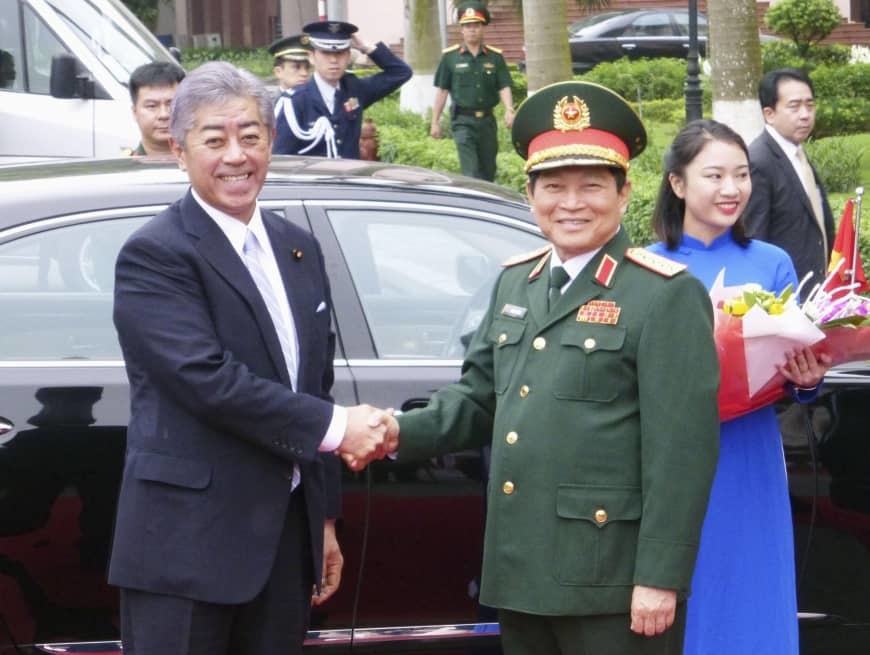 |
|
Vietnamese Defense Minister Ngo Xuan Lich and his Japanese counterpart Takeshi Iwaya in Hanoi in early May. Photo: Kyodo
|
The decades-long defense ties have been intensified with Hanoi seeing Tokyo as one important player to engage as part of its wider omnidirectional foreign policy and Tokyo viewing Hanoi as a key node in its greater engagement in Southeast Asia.
The ties cover maritime security assistance, new naval drills, Japanese port calls, an agreement on coast guard cooperation, and discussions of future opportunities on defense industrial cooperation, according to The Diplomat.
During Japanese Defense Minister Takeshi Iwaya's to Vietnam last week, his Vietnamese counterpart Ngo Xuan Lich confirmed in Hanoi last week that the two countries would work together to peacefully resolve the regional issues amid the Chinese expansionism in the sea, media from both Japan and Vietnam have reported.
Takeshi Iwaya and Ngo Xuan Lich took stock of bilateral ties and assessed the trajectory of the relationship. On regional and global issues, the Japanese defense minister stressed the importance of North Korea’s denuclearization, maritime security and freedom of navigation, a mutual concern for both sides in the East Sea, The Japan Times reported.
Decades-long defense ties
During their talks in Hanoi, the top defense officials agreed to boost the relations in the years to come basing on a memorandum of understanding signed in October 2011 and the Vietnam-Japan Joint Vision on defense in the next decade inked in April 2018.
Vietnamese Defense Minister Ngo Xuan Lich thanked Japan for its financial support to Vietnam’s post-war recovery process and Japanese initiatives in the framework of the ASEAN Defense Minister’s Meeting-Plus (ADMM-Plus).
The discussions in the Vietnamese capital were the first official talks between the two countries’ defense ministers since June last year.
Back in 2007, the two sides agreed in the Joint Statement that they would exchange high-ranking visits and port calls paid by the Japan Maritime Self-Defense Force (JMSDF), according to the BBC.
In the same year, they held joint search and rescue exercises off Vietnam’s Danang shore.
In 2008, Japan’s Yamayuki, Masuyuki, and Hamayuki destroyers visited Vietnam in five days.
In 2009, Vietnam and Japan exchanged military visits, port calls, and search and rescue.
In 2011, the two countries reached an agreement on air force and air defense.
New era
“Japan hopes to further deepen ties with Vietnam in the era of Reiwa,” Iwaya said at the outset of talks with Lich, referring to the nation’s new imperial era under Emperor Naruhito, who ascended the throne last month.
Lich told Iwaya that he hopes his visit to Vietnam will “contribute to pushing bilateral defense ties to a new stage,” The Japan Times has reported.
In line with Iwaya’s visit to Vietnam, the two countries’ defense authorities exchanged a memorandum of understanding stipulating the two governments’ intention to call for cooperation between the Japanese and Vietnamese defense industries.
Based on the MOU, cooperation is likely to be promoted in fields such as maritime security, humanitarian assistance, disaster relief and cybersecurity.
Iwaya explained Japan’s latest national defense guidelines that were endorsed in December last year, which called China’s military activities in the East Sea and surrounding waters “a serious security concern for the region including Japan and for the international community.”
Vietnam and Japan have also already been discussing prospects for collaboration on this front and attempting to better understand each side’s procurement and defense industrial capabilities.
The shape of cooperation in this sphere would include capacity-building and cooperation in familiar areas such as military medicine, humanitarian assistance and disaster relief, and peacekeeping. Hanoitimes
 Hanoi and Tokyo have been boosting their defense ties as part of their broader extensive strategic partnership over the past few years in the course of perplexity in the East Sea where Beijing flexes military muscle.
Hanoi and Tokyo have been boosting their defense ties as part of their broader extensive strategic partnership over the past few years in the course of perplexity in the East Sea where Beijing flexes military muscle.